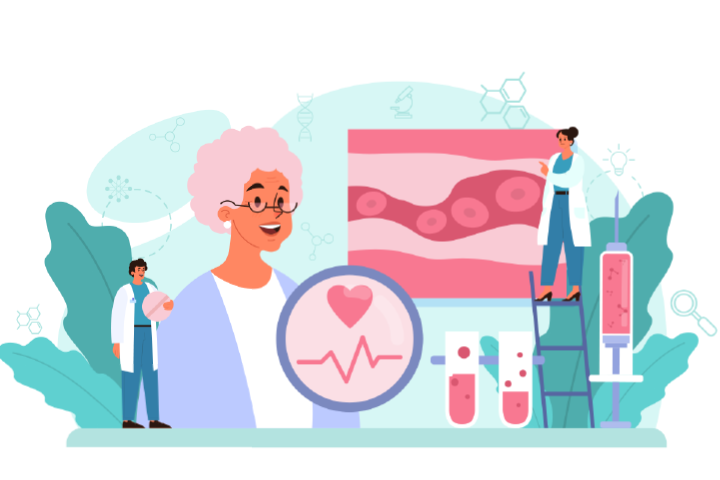Your favorite singer may say their hearts are “aflutter," but in real life, a fluttering heart can be a scary problem. Every day, electrical signals travel through your heart to make it beat regularly. If your heart isn't beating regularly, you could have an arrhythmia.
Arrhythmias can make it feel like your heart is flip-flopping, beating too fast, too slow, or skipping beats. There are several different kinds of arrhythmias, some of which can be normal variations in heartbeat, while others need medical attention.
Palpitations
Palpitations are skipped, extra or irregular heartbeats. They can become more common as you age and are usually harmless. They can be triggered by:
- anxiety or stress
- intense exercise or physical activity
- hormone changes
- stimulants like caffeine, nicotine or certain medications
- alcohol
If you have palpitations on a regular basis or if they become more intense, talk to your Primary Care Provider. It could indicate a more serious problem. If you have palpitations in combination with any of these symptoms, go to the nearest emergency room, or call 911:
- chest pain
- trouble breathing
- fainting
- lightheadedness

Atrial Flutter vs. Atrial Fibrillation
Atrial flutter and atrial fibrillation are the most common types of arrhythmias. They both result in a faster heartbeat, but atrial fibrillation, or A-fib, also causes the heart to beat irregularly, or out of rhythm.
You might feel symptoms like chest pain, or a racing and pounding heart inside your chest.
On the other hand, some people who have A-fib may not feel symptoms at all. It may come on suddenly in between periods of a normal heart rhythm, or it may become a long-term issue that causes problems with the heart's ability to pump blood.
Although it can occur by itself, A-fib usually happens because of other health issues, like:
- high blood pressure
- heart disease
- sleep apnea
- excessive alcohol use
A-fib raises your risk for stroke. When your heart doesn't beat normally, blood stays inside the heart's chambers for too long. This can cause a blood clot to form. It can travel to an artery in the brain and get stuck there, causing a stroke.
People with A-fib may have a five times higher risk of stroke than people without A-fib.
The good news is that more than half of A-fib cases can be avoided with simple lifestyle changes. You should:
- Get regular physical activity.
- Eat a heart-healthy diet with plenty of veggies, fruits and whole grains and limited saturated fat, trans-fat and cholesterol.
- Don't smoke.
- Keep a healthy weight.
- Limit or avoid caffeine and alcohol.
- Keep your blood pressure and cholesterol in a healthy range.
- Control your blood glucose if you're diabetic.

Resources for TRS-ActiveCare and TRS-Care Standard
Provider Finder®
If you're concerned about palpitations or a potential arrhythmia, schedule a visit with your PCP. They may want you to visit with a cardiologist or other specialist. If you don't have a PCP, or want to find a new one, use our Provider Finder® to search by location, gender and specialty. A Personal Health Guide can also help you find an in-network provider 24/7. Call 1-866-355-5999 or chat through the BCBSTX App.
The Fitness Program
Sign up for the Fitness Programto get affordable, no-contract memberships at gyms nationwide.
Well onTarget®
Sign up for self-guided digital courses on managing stress, improving your fitness level and dietary habits, losing or maintaining weight and improving cholesterol and blood pressure.
Resources for TRS-Care Medicare
Annual Wellness Visits
Your plan covers one physical exam and one wellness visit per calendar year. You can ask your provider to combine the visits into one convenient annual care appointment. You and your provider can work as a team to create a preventive care plan for the year.
24/7 Nurse Support
Helps make your health decisions simple and convenient while providing:
- Quick answers to your health questions anytime, anywhere
- Access to registered nurses with clinical experience
- Information to guide your health care decisions
Call 1-877-365-7949, TTY 711 any time for health information and support – at no added cost to you.
Virtual Doctor Visit
See a doctor anytime using live video chat from your computer, tablet or smartphone. With Virtual Doctor Visits, you can ask questions, get a diagnosis or even get medication prescribed and have it sent to your pharmacy. All you need is a strong internet connection. Consider setting up an account with a Virtual Doctor Visit provider so you're ready when it's time to make an appointment.
Ways to access Virtual Doctor Visits:1. On your computer, visit uhcvirtualvisits.com and click on Choose a Medical Provider 2. On your tablet or smartphone:
- Download the American Well (Amwell) app
- Download the Doctor on Demand app
Download the Teladoc app or call 1-855-615-8335 to set up an account and request a visit by phone
Mental Health Virtual Visits
Connect with a mental health expert on your computer, tablet or smartphone. Visit VirtualVisitsMentalHealth.uhc.com to select a health care provider. They can evaluate and treat conditions such as depression and anxiety, and address substance use concerns.
On-demand Self Care
Self Care from AbleTo gives you access to self-care techniques, coping tools, meditations, and more—anytime, anywhere. With Self Care, you get personalized content to help boost your mood and shift your perspectives. Tap into tools created by clinicians and suggested for you based on your responses to a short, optional assessment. Self Care is here to help you feel better — at no added cost to you. To start, visit ableto.com/begin. Questions? We're here to help. Call UnitedHealthcare at 1-866-347-9507, TTY 711, 7 a.m.–6 p.m. CT, Monday–Friday.
Optum Behavioral Health
Optum Behavioral Health has more than 87,000 network providers offering inpatient and outpatient services, such as therapy, behavioral health assessment and medication management. To start, call the behavioral health number on your member ID card or visit your member website and select “Find Care."
Silver Sneakers
As a TRS-Care Medicare Advantage participant you have access to SilverSneakers, a fitness and lifestyle program, at no added cost. What does SilverSneakers include?
- Memberships to thousands of fitness locations — visit as many times as you wish
- Group exercise classes for all abilities — fun activities held outside the gym
- SilverSneakers On-DemandTM — online workout videos that feature tips on fitness and nutrition
- SilverSneakers LIVE — virtual classes and workshops throughout the week
- SilverSneakers GOTM mobile app
Get started today. Visit SilverSneakers.com or call 1-888-423-4632, TTY 711.
Personal Emergency Response System (PERS)
As a TRS-Care Medicare Advantage participant, you can access a Personal Emergency Response System (PERS) at no added cost. The Lifeline PERS lets you ask for help when you need it — 365 days a year, 24/7. Just push the help button on your wearable device and a trained care specialist will quickly connect you to help.
Members, family members, caregivers, and health care professionals may enroll an eligible member by calling 1-855-595-8485, TTY 711, or visiting lifeline.com/uhcgroup. Please be sure to have the member address (where we'll provide the service), telephone number, date of birth and preferred language.